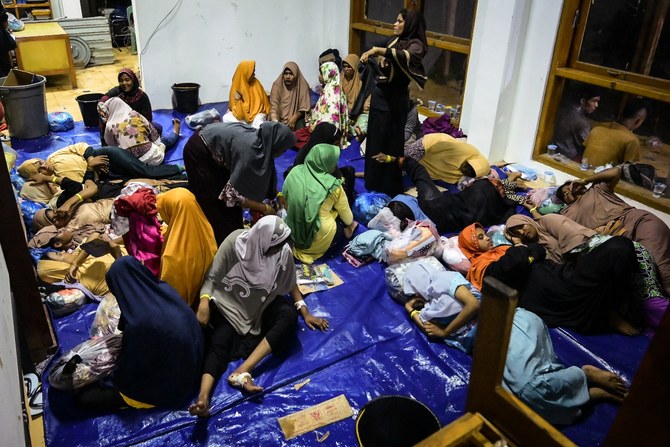
The Rohingya have been described as the most persecuted minority in the world, as a result of decades of systematic discrimination and violence. Their plight has culminated in their current status as stateless refugees, predominantly residing in the world’s largest refugee camp in Cox’s Bazar, Bangladesh.
Now the small number of Rohingya who remain in Myanmar are facing the specter of yet another genocide, trapped between the country’s brutal military junta and the Arakan Army rebel group.
The roots of the Rohingya crisis can be traced back to longstanding ethnic and religious tensions in Myanmar. The Rohingya, who are predominantly Muslim, have long faced discrimination from the Buddhist majority in the country.
Despite having lived in Myanmar for generations, the Rohingya are denied citizenship under a 1982 Burmese nationality law, rendering them stateless. This legal exclusion has been accompanied by restrictions on movement, access to education and employment, as well as periodic outbreaks of violence targeting them.
In 2017, a brutal military crackdown in Myanmar, described by the UN as a “textbook example of ethnic cleansing,” forced more than 700,000 Rohingya to flee to Bangladesh. The refugees settled in makeshift camps in Cox’s Bazar that have grown into the largest refugee settlement in the world. The conditions in these camps are dire, with overcrowding, inadequate sanitation, and limited access to healthcare and education.
The statelessness of the Rohingya and the limited intervention by the international community have left them in a persistent state of limbo
Dr. Azeem Ibrahim
Regionally, the Rohingya are largely unwanted. Myanmar continues to deny them citizenship and basic rights, while neighboring countries such as Thailand, Malaysia and India either refuse to allow fleeing Rohingya to enter or impose severe restrictions on their stays. This widespread regional reluctance to accept the Rohingya underscores their precarious situation.
Bangladesh, which hosts nearly a million Rohingya, is eager to repatriate them. The country faces significant economic, environmental and social pressures arising from the prolonged presence of such a large refugee population. It has attempted to relocate some Rohingya to Bhasan Char, an isolated island prone to flooding, and has engaged in repatriation talks with authorities in Myanmar, though concerns about safety and dignity have stalled this plan.
The statelessness of the Rohingya and the limited intervention by the international community have left them in a persistent state of limbo, with no country willing to offer a permanent home. Their struggle highlights the dire consequences of systemic persecution and the complexities of refugee crises in a geopolitically sensitive region.
Now, as the junta battles the Arakan Army in Rakhine State, the Rohingya find themselves caught in the crossfire, suffering civilian casualties, further displacement, and the destruction of their homes and property.
In a cruel twist of fate, the same military that committed acts of genocide against the Rohingya is now forcibly conscripting them into its ranks, using them as human shields on the front lines against the Arakan Army. Men and boys are abducted from their homes and refugee camps, given minimal training and sent to face the very rebel group that claims to be fighting for their rights.
Testimonies provided by escaped Rohingya conscripts paint a harrowing picture of coercion, exploitation and utter disregard for their lives. One man recounted how his group was sent to an area surrounded by Arakan Army fighters to serve as mere cannon fodder, the junta fully aware they would likely be killed.
As the conflict between the junta and the Arakan Army escalates, Rohingya villagers find themselves caught in the middle, with both sides inflicting civilian casualties and destroying homes. The Arakan Army, an ethnic Rakhine Buddhist rebel group, has vowed to expand its control over Rakhine State but its stance on the Rohingya remains ambiguous.
While it has warned Rohingya not to join the junta’s forces, there are also reports of the rebel group confiscating food and other resources from Rohingya communities. They are therefore left with the impossible choice of siding with the military that committed genocide against them or the rebel group that remains unclear in its intentions for their future.
The forced conscription of Rohingya by the military junta is a flagrant violation of international law
Dr. Azeem Ibrahim
The renewed violence has exacerbated the already dire humanitarian crisis the Rohingya face in Rakhine State. More than 100,000 people, many of them already displaced by previous violence, have been forced to flee their homes once again. Access to aid and medical care is severely restricted, leaving the vulnerable population at grave risk.
Bangladesh, which as noted hosts more than a million Rohingya refugees, has closed its borders, leaving those who flee the violence with nowhere to go. Families are resorting to digging holes within their homes in which to shelter and hide from fighting and raids, in a desperate attempt to survive.
The international community must act swiftly to prevent another genocide against the Rohingya. Foreign governments should loudly condemn the junta’s actions and the escalating violence in Rakhine State, and demand an immediate cessation of hostilities and unfettered humanitarian access.
The forced conscription of Rohingya by the military junta is a flagrant violation of international law and must be halted immediately. The junta’s widespread and systematic abuses against the Rohingya amount to crimes against humanity and war crimes, for which its leaders must be held accountable.
The Arakan Army, too, must clarify its stance on the Rohingya and take concrete steps to protect the civilian population, adhering to the laws of war and ensuring the safety of noncombatants.
The Rohingya have endured unimaginable suffering, and the world cannot stand idly by as they face the threat of another genocide. Urgent action is needed to end the violence, provide humanitarian aid, and pave the way for a just and lasting solution that recognizes the Rohingya’s fundamental rights and dignity.
Dr. Azeem Ibrahim is the director of special initiatives at the Newlines Institute for Strategy and Policy in Washington, D.C. X: @AzeemIbrahim












